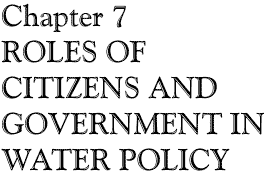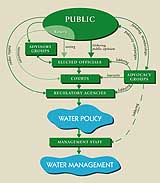
| ch. 7, pp. 107 - 108 |
Local water management is characterized by a complex web of overlapping, and occasionally conflicting political and geographical jurisdictions. Overlapping jurisdictions in the Tucson area are shown in Figure 7-10. Figure 7-11 provides a generalized model of municipal water policy management. Though attention tends to be focused on elected officials, many other “players” are involved. The public, particularly the voting public, has the ultimate say in most policy matters and has several avenues for influencing water policy (rules, laws and guidelines) and water management (implementation of policy). Coordinated and comprehensive basin-wide management has been advocated at various times. Such “watershed management” has several obvious advantages, and a few more subtle disadvantages. The most compelling reason cited for watershed management is the ability to treat water resources as part of an integrated system. In its most optimistic implementation, decisions such as land use, transportation and population growth all would be evaluated in terms of their basin-wide impact on water resources. Critics of the existing situation note the difficulty in establishing long-term plans when so many of the critical decisions are split among different agencies and groups. Moreover the responsibility to meet long-term demands is often unevenly distributed. For example, while developers are required to demonstrate a 100-year assured water supply, they are not required to consider the basin-wide impacts of their development. This raises some thorny hydrologic issues as well as concerns about relative inequity. In another example, some have complained that the costs of renewable supplies like CAP water have been disproportionately borne by Tucson Water customers. The expectation is that stronger basin-wide management would reduce disparities and promote true sustainability. Promoters also note that a watershed management authority could reduce some of the political and economic inefficiencies inherent in the current situation. The splintered nature of local water management can be counted as both a cost and a benefit. The inefficiency that results from multiple jurisdictions also can provide some measure of control against a single entity having too much authority. A watershed authority could make it easier to implement ecologically sound policies, but it also could be an efficient mechanism for mischief. Some people have argued that the Tucson region should have a government agency with powers to buy and sell water throughout the region and to determine who uses which kinds of water. There could still be private water companies under the larger umbrella agency. The Tucson City Council vetoed establishing an agency with some of these powers when it voted against establishing the Santa Cruz Valley Water District in 1993. This agency would have had some of the responsibilities of the Central Arizona Groundwater Replenishment District for this area. Benefits of area-wide management include reserving the highest quality water for municipal use while lower quality water would be used for industry and agriculture. Also the costs of augmenting the supply could be distributed more fairly throughout the region. The managers could either be elected directly by the voters or appointed by the county and cities in the region. One argument against this approach is that the managers would have enormous power. If they were appointed, with one vote per city (like PAG), Tucson city residents would be unfairly under-represented. If they were elected, it might be difficult to adequately educate voters about the qualifications of these managers with highly technical responsibilities. People who generally support less government are opposed to increasing government power over water. A change in state law would be required to create such an agency as well as approval of local governments and the voters. For this agency to acquire private water co mpanies a company would either have to be willing or be acquired through condemnation. This approach, while having some benefits, has generally not been considered politically feasible. TUCSON WATER OPERATIONAL OPTIONS Some people have argued that private water companies should provide all water service in the area, and that Tucson (or any government) should not be in the water business. They argue that Tucson Water should privatize its operations because this would distance a professional service from political decision-making. They point out that Tucson Electric Power provides power very effectively as a stockholder-owner corporation and that Tucson Water could do the same. If it were a private water company, the ACC would oversee water rates, not local politicians. Opponents argue that customers are better protected by officials they elect directly and that a profit-making company would probably have to charge higher rates. They also argue that if the company had to go through costly rate hearings, they would have to charge more for water. Others note that water is fundamentally different from electricity, natural gas and other utilities in ways that argue for public ownership. Water has public health, aesthetic, and environmental aspects that the others lack. The public may be willing to pay more for water supplies that are purer or sustainable, or to subsidize certain public uses or water. Thus, the private sector may not be the best provider.
|

